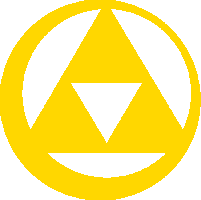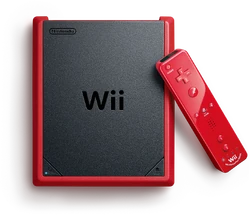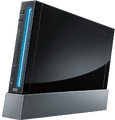mNo edit summary |
(→Trivia) |
||
| (45 intermediate revisions by 21 users not shown) | |||
| Line 1: | Line 1: | ||
{{exitstub-nintendo}} |
{{exitstub-nintendo}} |
||
| − | {{ |
+ | {{System |
| − | | |
+ | |image= [[File:Wii Logo.png|320px]][[File:Wii Console.png|320px]] |
| − | | |
+ | |type= Home console |
| − | | |
+ | |released= '''Original'''<br>{{release|na= November 19, 2006|jp= December 2, 2006|eu= December 8, 2006|aus= December 7, 2006}}<br>'''Family Edition'''<br>{{release|na= October 23, 2011<ref name="NArelease">[http://www.officialnintendomagazine.co.uk/31328/newsnew-black-wii-bundle-includes-mario-cd/ Official Nintendo Magazine]</ref>|eu= November 4, 2011<ref name="PALrelease">[http://www.nintendo.co.uk/NOE/en_GB/news/2011/45337.html Nintendo News]</ref>}} |
| − | | |
+ | |media= {{Wp|Nintendo optical disc|Wii Optical Disc}},<br>{{Wp|Nintendo optical disc|Nintendo GameCube Game Disc}},<br>{{Wp|Secure Digital card|SD card}} |
| − | | |
+ | |predecessor= [[Nintendo GameCube]] |
| − | | |
+ | |successor= [[Wii U]] |
}} |
}} |
||
| − | The '''Wii''' |
+ | The '''Wii''' is [[Nintendo]]'s 5th major gaming console, intended to succeed the [[Nintendo GameCube]] and compete with the Microsoft's Xbox 360 and Sony's PlayStation 3. All consoles come with the game ''Wii Sports'', which was something unique to a console release. Its American release date was November 19th at a manufacturer's suggested retail price of $249.99, and December 7th in Australia with a manufacturer's suggested retail price of $399.99.<ref>{{Cite web|quote=It will appear in 25,000 retail locations with an MSRP of $249.99.|published= September 14, 2006|url=http://www.1up.com/do/newsStory?cId=3153637|title=Live from New York -- It's the Wii Conference|site=1UP.com}}</ref> |
==''The Legend of Zelda'' Games== |
==''The Legend of Zelda'' Games== |
||
| + | *{{TP}} {{Exp|Wii Version}} |
||
| − | *''[[The Legend of Zelda: Twilight Princess|Twilight Princess]]'' |
||
| ⚫ | |||
| − | *''[[Link's Crossbow Training]]'' |
||
| − | * |
+ | *{{SSBB}} (not an official [[The Legend of Zelda (Series)|''Zelda'' game]], but it features ''Zelda'' characters) |
| + | *{{SS}} |
||
| ⚫ | |||
| − | * |
+ | **[[The Legend of Zelda: Skyward Sword Save Data Update Channel|''The Legend of Zelda: Skyward Sword'' Save Data Update Channel]] |
===Virtual Console=== |
===Virtual Console=== |
||
| − | * |
+ | *{{TLoZ}} ([[Nintendo Entertainment System]]) |
| − | * |
+ | *{{TAoL}} (Nintendo Entertainment System) |
| − | * |
+ | *{{ALttP}} ([[Super Nintendo Entertainment System]]) |
| − | * |
+ | *{{OoT}} ([[Nintendo 64]]) |
| − | * |
+ | *{{MM}} (Nintendo 64) |
| + | ===Backwards Compatible=== |
||
| ⚫ | Games on the Virtual Console can be played using different controllers. NES games can be played using the Wii Remote. The Classic Controller can be used for any game, although its design is best suited for SNES games. The GameCube Controller, while also universal, is best suited for |
||
| + | *{{TP}} {{Exp|GameCube Version}} |
||
| + | *{{TWW}} |
||
| + | *{{FSA}} |
||
| + | *{{MQ}} |
||
| + | *{{CE}} |
||
| ⚫ | |||
| ⚫ | Games on the Virtual Console can be played using different controllers. NES games can be played using the Wii Remote. The Classic Controller can be used for any game, although its design is best suited for SNES games. The GameCube Controller, while also universal, is best suited for GameCube and N64 games. |
||
| ⚫ | |||
| + | |||
| ⚫ | It should be noted that N64 games do not support force feedback, despite the GameCube controller being equipped with built-in vibration. This is due to the N64 controller requiring an expansion pack for force-feedback. However, the GameCube releases of the N64 Zelda games did support a rumble function. |
||
Because the GameCube Controller has a different design than the N64 controller, the buttons have been redesigned. The most notable changes are the Z button being mapped to the L button, which is placed in a similar location to the old Z button. Also, the C-Stick accounts for the C-buttons (although the X/Y/Z buttons also work). The C-Stick is logical since it has the same color and is also labeled C. |
Because the GameCube Controller has a different design than the N64 controller, the buttons have been redesigned. The most notable changes are the Z button being mapped to the L button, which is placed in a similar location to the old Z button. Also, the C-Stick accounts for the C-buttons (although the X/Y/Z buttons also work). The C-Stick is logical since it has the same color and is also labeled C. |
||
====Changes==== |
====Changes==== |
||
| − | Although Nintendo strives to release each game unaltered, there have been some notable changes to the Zelda titles. |
+ | Although Nintendo strives to release each game unaltered, there have been some notable changes to the Zelda titles. In ''The Legend of Zelda'', the intro story was entirely rewritten. For example, "All of treasures" was corrected to "All treasures" in the introduction, to make better grammatical sense (although "look up the manual for details" remains unaltered). {{OoT|-}} saw an emulation in the Virtual Console of the version that omitted all Muslim references. |
==Family Edition== |
==Family Edition== |
||
| Line 41: | Line 49: | ||
|caption= The Wii Family Edition |
|caption= The Wii Family Edition |
||
}} |
}} |
||
| − | The '''Wii Family Edition''' is a revised model of the Wii released at a reduced price in 2011 on October 23 and November 4 in North America and Europe, respectively.<ref name="NArelease" /><ref name="PALrelease" /> The Wii Family Edition is designed to sit uniquely in the horizontal position.<ref>{{Cite web|quote=The console is designed to sit horizontally, so say goodbye to those stands.|published=August 17, 2011|retrieved=December 10, 2011|url=http://www.destructoid.com/new-slim-wii-announced-won-t-play-gamecube-games-209100.phtml|title=New slim Wii announced, won't play GameCube games|site=Destructoid}}</ref> It is not compatible with |
+ | The '''Wii Family Edition''' is a revised model of the Wii released at a reduced price in 2011 on October 23 and November 4 in North America and Europe, respectively.<ref name="NArelease" /><ref name="PALrelease" /> The Wii Family Edition is designed to sit uniquely in the horizontal position.<ref>{{Cite web|quote=The console is designed to sit horizontally, so say goodbye to those stands.|published=August 17, 2011|retrieved=December 10, 2011|url=http://www.destructoid.com/new-slim-wii-announced-won-t-play-gamecube-games-209100.phtml|title=New slim Wii announced, won't play GameCube games|site=Destructoid}}</ref> It is not compatible with GameCube games and accessories.<ref>{{Cite web|quote=. . .the new system will no longer play GameCube titles. |published=August 17, 2011|retrieved=December 10, 2011|url=http://www.destructoid.com/new-slim-wii-announced-won-t-play-gamecube-games-209100.phtml|title=New slim Wii announced, won't play GameCube games|site=Destructoid}}</ref> |
| − | In North America, a blank version of the Wii comes bundled with a copy of '' |
+ | In North America, a blank version of the Wii comes bundled with a copy of ''{{Smw|New Super Mario Bros. Wii}}'' and a copy of the ''{{Smw|Super Mario Galaxy}}'' {{Smw|Super Mario Galaxy: Original Soundtrack|Original Soundtrack CD}}.<ref>{{Cite web|quote=The new bundle will include the newly configured black Wii, a copy of New Super Mario Bros Wii and a copy of the Super Mario Galaxy soundtrack CD.|published=October 11, 2011|retrieved=December 10, 2011|url=http://www.officialnintendomagazine.co.uk/31328/newsnew-black-wii-bundle-includes-mario-cd/|title=New black Wii bundle includes Mario CD|site= The Official Nintendo Magazine}}</ref> In Europe, the Wii Family Edition comes bundled with a Wii MotionPlus Remote and copies of ''Wii Sports'' and ''Wii Party''.<ref>{{Cite web|quote=A bundle with the new system has been announced for Europe and will come with one Wii MotionPlus Remote, Wii Sports, and Wii Party.|published=August 17, 2011|retrieved=December 10, 2011|url=http://www.destructoid.com/new-slim-wii-announced-won-t-play-gamecube-games-209100.phtml|title=New slim Wii announced, won't play GameCube games|site=Destructoid}}</ref> |
The Wii Family Edition was not made to replace the original Wii model; the latter is still being sold as normal. |
The Wii Family Edition was not made to replace the original Wii model; the latter is still being sold as normal. |
||
| + | |||
| + | ==Wii Mini== |
||
| + | {{Image |
||
| + | |image=Wii Mini.png |
||
| + | |type=caption |
||
| + | |size=250px |
||
| + | |align=right |
||
| + | |caption= The Wii Mini |
||
| + | }} |
||
| + | A completely different model of the Wii, called the Wii Mini, was released in Canada in 2012 and in Europe in 2013. Like the Family Edition, the Wii Mini does not support GameCube games or peripherals. The Wii Mini also does not have any internet capabilities and does not include an SD card slot. The Wii Mini also features a top-loading disc drive, like that of the GameCube, instead of the original Wii's slot-loading drive. |
||
| + | |||
| + | {{Clear}} |
||
==Trivia== |
==Trivia== |
||
| + | *The Wii is the first Nintendo console to have a ''The Legend of Zelda'' title available at launch (not counting the [[Famicom Disk System]] add-on) with the [[Nintendo Switch]] being the second. |
||
| − | *Using the Virtual Console, as well as the system's ability to play GameCube games, every console ''Zelda'' game to date can be played on the Wii. This does not apply to the Wii Family Edition or any Korean Wii, as neither model is backwardly compatible with Gamecube games. |
||
| + | |||
| + | ==Nomenclature== |
||
| + | {{Names |
||
| + | |align= left |
||
| + | |enBr= |
||
| + | |enBrM= |
||
| + | |ja= {{Romanize|ウィー|Uī}} |
||
| + | |jaM= |
||
| + | |zhS= |
||
| + | |zhSM= |
||
| + | |zhT= |
||
| + | |zhTM= |
||
| + | |nl= |
||
| + | |nlM= |
||
| + | |fi= |
||
| + | |fiM= |
||
| + | |frC= |
||
| + | |frCM= |
||
| + | |frF= |
||
| + | |frFM= |
||
| + | |de= {{De|Wii}} |
||
| + | |deM= |
||
| + | |hu= |
||
| + | |huM= |
||
| + | |it= |
||
| + | |itM= |
||
| + | |ko= |
||
| + | |koM= |
||
| + | |no= |
||
| + | |noM= |
||
| + | |pl= |
||
| + | |plM= |
||
| + | |ptB= |
||
| + | |ptBM= |
||
| + | |ptP= |
||
| + | |ptPM= |
||
| + | |ru= |
||
| + | |ruM= |
||
| + | |esS= |
||
| + | |esSM= |
||
| + | |esL= |
||
| + | |esLM= }} |
||
==Gallery== |
==Gallery== |
||
<gallery> |
<gallery> |
||
File:Black Wii.png|A black Wii |
File:Black Wii.png|A black Wii |
||
| + | File:Wii Wiimote usage screen.png|A Wii screen instructing users how to use Wii remotes |
||
| + | File:Wii Warning Screen full-screen.png|A Wii warning screen reminding users to use Wii remotes safely |
||
| + | File:Wii Golden Nunchuk.png|The special eddition Wii nunchuck available at Club Nintendo |
||
| + | File:Gold Wii Remote Plus.png|The special edition Wii Remote Plus bundled with {{SS|-}} |
||
</gallery> |
</gallery> |
||
| − | |||
| ⚫ | |||
| − | |||
== External Links == |
== External Links == |
||
*[http://www.wii.com/ Wii's] official website. |
*[http://www.wii.com/ Wii's] official website. |
||
| + | |||
| + | {{Ref}} |
||
[[Category:Systems]] |
[[Category:Systems]] |
||
Revision as of 04:35, 6 July 2020
Template:Exitstub-nintendo Template:System The Wii is Nintendo's 5th major gaming console, intended to succeed the Nintendo GameCube and compete with the Microsoft's Xbox 360 and Sony's PlayStation 3. All consoles come with the game Wii Sports, which was something unique to a console release. Its American release date was November 19th at a manufacturer's suggested retail price of $249.99, and December 7th in Australia with a manufacturer's suggested retail price of $399.99.[1]
The Legend of Zelda Games
- Twilight Princess

- Link's Crossbow Training
- Super Smash Bros. Brawl (not an official Zelda game, but it features Zelda characters)
- Skyward Sword
Virtual Console
- The Legend of Zelda (Nintendo Entertainment System)
- The Adventure of Link (Nintendo Entertainment System)
- A Link to the Past (Super Nintendo Entertainment System)
- Ocarina of Time (Nintendo 64)
- Majora's Mask (Nintendo 64)
Backwards Compatible
- Twilight Princess

- The Wind Waker
- Four Swords Adventures
- Master Quest
- Collector's Edition
- Super Smash Bros. Melee (not an official Zelda game, but it features Zelda characters)
Games on the Virtual Console can be played using different controllers. NES games can be played using the Wii Remote. The Classic Controller can be used for any game, although its design is best suited for SNES games. The GameCube Controller, while also universal, is best suited for GameCube and N64 games.
It should be noted that N64 games do not support force feedback, despite the GameCube controller being equipped with built-in vibration. This is due to the N64 controller requiring an expansion pack for force-feedback. However, the GameCube releases of the N64 Zelda games did support a rumble function.
Because the GameCube Controller has a different design than the N64 controller, the buttons have been redesigned. The most notable changes are the Z button being mapped to the L button, which is placed in a similar location to the old Z button. Also, the C-Stick accounts for the C-buttons (although the X/Y/Z buttons also work). The C-Stick is logical since it has the same color and is also labeled C.
Changes
Although Nintendo strives to release each game unaltered, there have been some notable changes to the Zelda titles. In The Legend of Zelda, the intro story was entirely rewritten. For example, "All of treasures" was corrected to "All treasures" in the introduction, to make better grammatical sense (although "look up the manual for details" remains unaltered). Ocarina of Time saw an emulation in the Virtual Console of the version that omitted all Muslim references.
Family Edition
The Wii Family Edition is a revised model of the Wii released at a reduced price in 2011 on October 23 and November 4 in North America and Europe, respectively.[2][3] The Wii Family Edition is designed to sit uniquely in the horizontal position.[4] It is not compatible with GameCube games and accessories.[5]
In North America, a blank version of the Wii comes bundled with a copy of New Super Mario Bros. Wii and a copy of the Super Mario Galaxy Original Soundtrack CD.[6] In Europe, the Wii Family Edition comes bundled with a Wii MotionPlus Remote and copies of Wii Sports and Wii Party.[7]
The Wii Family Edition was not made to replace the original Wii model; the latter is still being sold as normal.
Wii Mini
A completely different model of the Wii, called the Wii Mini, was released in Canada in 2012 and in Europe in 2013. Like the Family Edition, the Wii Mini does not support GameCube games or peripherals. The Wii Mini also does not have any internet capabilities and does not include an SD card slot. The Wii Mini also features a top-loading disc drive, like that of the GameCube, instead of the original Wii's slot-loading drive.
Trivia
- The Wii is the first Nintendo console to have a The Legend of Zelda title available at launch (not counting the Famicom Disk System add-on) with the Nintendo Switch being the second.
Nomenclature
| Language | Name | |
|---|---|---|
| Japanese | ウィー (Uī) | |
| German | Wii | |
Gallery
External Links
- Wii's official website.






